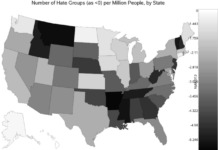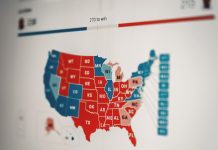When the unknown Alvin Greene won a primary election for U.S. Senate in June 2010, it wasn’t just South Carolina that was surprised.
The shock that an unemployed, non-honorably discharged military veteran awaiting trial for felony obscenity charges could somehow beat a well-known political figure ? and without having done any type of campaigning or advertising ? shook from coast to coast, including the West Coast home of Jason Grant Smith.
But the writer/director didn’t respond in the same way progressive South Carolinians did, most of whom just argued (and drank) and debated (and drank) instead of trying to figure out just how the heebie jeebies did a character like Greene wind up taking 60 percent in that Democratic primary race.
Instead, Smith actually sought answers, which he’s finalizing into a film titled ?I Voted??
The documentary, now in post-production phase, covers not just Greene’s surprising upset; it also details the imposition of modern voting systems, such as the ES&S touch-screen voting machines still used throughout South Carolina, that can’t be properly audited to determine accuracy or integrity.
After mini-screenings in South Carolina and other states in 2013, ?I Voted?? is now being finalized for release at upcoming film festivals in the mid-term election cycle.
Like most Americans, Smith was mystified at the news of Greene’s shocking upset, which made national media just minutes after the polls closed on June 8, 2010. He recalls:
I couldn’t understand how it was that in our 24-hour news cycle, nobody could figure out what happened.
David Axelrod (nationally-known campaign advisor) was on ?Meet the Press? shortly after Greene’s nomination and he couldn’t explain it. Obviously, something bizarre was taking place and I wanted to try and understand it.
He landed in South Carolina with camera in hand two months before the 2010 general election searching for answers to those questions many still have.
From Greeneville to Charleston and much in between, he spoke with election officials and political activists. He asked computer scientists and voting machine critics. Smith questioned local media, and even got insight from national media icon Dan Rather.
While traversing South Carolina, I tumbled into the byzantine rabbit hole of American elections,? he describes, ?a mechanism rife with technical, legal, accessibility, and people challenges.
But while South Carolina’s well-known for using questionable electronic voting machines that offer no paper trail records to confirm their results, 15 other states use them, too. As a result, Smith had to widen the focus. He says:
I had no idea that 24 percent of the country uses touch-screen systems that are paperless and cannot be audited or recounted.
To me, that’s a big deal. And I cannot comprehend why this isn’t a bigger deal to the rest of the electorate.
Not that he’s some political expert or anything ? (?In 6th grade I was the campaign manager for a friend running for President of Student Council,? he recalls. ?I think he won, but I don’t remember.?) ? but he is a voter. And just like all of the 185 million or so who are registered in the U.S., he wants his vote to be accurately recorded.
After all, the right to vote ?is the right from which all other rights are derived,? Smith offers; ?the cornerstone of our democracy.
Most people engage in faith-based voting, meaning that they have ?faith? our system works. I’m simply asking, upon what specifically are we basing this faith?
I think when you open the hood on the engine of our democracy, the answers are very disturbing.
This won’t be some conspiracy flick, though.?This really isn’t an expos? or the hunt for a smoking gun.
Smith stresses that he holds the project at a bilateral level, too.
With the goal of facilitating a non-partisan dialogue, the documentary’s focus narrows on the administration of recording and counting ballots, a challenging issue that affects us all, rather than the more politically-driven aspects of elections, such as voter identification and redistricting.
?I Voted?? definitely adds a lot of fun to the facts it reports, too, which Smith says is a necessary part of the picture.?Smith promises:
I’m trying to provide a film that’s ?info-taining. If I bore people, it doesn’t matter how important my material is because I will have lost my audience.
Consequently, humor is a major part of my mission.
?I Voted?? doesn’t just report on the problems these so-called voting machines impose, however. Smith hopes his documentary can offer insight on how to correct them, too. He offers:
I think we need laws that mandate durable records of voter-marked intent. In other words, paper ballots.
?In addition, we need to ensure that these ballots are audited.? I wouldn’t suggest that current paperless systems are getting it wrong.? It’s more the concern that there’s no way to know.? Even a broken clock is right twice a day.
Paperless systems cannot prove the outcome, and if we can’t prove the outcome to the losers, how do we know we got it right?
In addition, I would suggest that the software not be proprietary,? unlike that used in South Carolina’s ES&S vote recorders, details of which the company won’t release.
Taxpayer dollars should not go toward systems that cannot be publicly examined.
It’s not the full fault of the company, though, Smith finds.
The vendors are not the bad guy.?The voting-machine business is a terrible business.? This is not a scalable market, and the economic barriers to entry are high. Consequently, innovation is stifled.
Instead, Smith offers:
I would suggest that perhaps voting vendors should be like quasi-public utilities.? I do not think that the private sector can support the level of innovation and technology required in America’s voting systems.
There’s no money to be made here.? That’s why you don’t see Apple or Microsoft in this business. Diebold was in it and they got out and took a huge financial loss.? We currently have voting systems that are fragile and just good enough to pass certification.
We’re the United States.? We can do better.? We have to fund democracy.? It’s our greatest export, right?? It’s easy to point fingers at politicians, vendors, and election officials but the responsibility ultimately rests with the citizenry ? ?we the people.? We have to reclaim our elections and demand transparency and accountability.
Smith also advocated for laws that mandate evidence-based elections, meaning ?elections that can be completely reconstructed utilizing a voter-marked, durable record of intent and risk-limited audits. He adds:
I also want to offer cost-effective remedies that will put us on the path toward more election integrity.
Offering cost-effectiveness in its own production is where ?I Voted?? could still use some help, though. While he’s received some tax-deductible donations, and was recently awarded with Roy W. Dean competitive film grant, Smith still has financial hurdles to clear in order to bring the documentary to general audiences in 2014. (On the right side of the header of the film’s website, see ?click here to make a tax deductible donation for the film’s completion.?)
And, yes ? your online-submitted donations will be tax-deductible, as they’ll be accepted and processed by From the Heart Productions, a charitable 501(c)3 organization dedicated to aiding films that are ?unique and make a contribution to society.?
Smith’s no newbie to movies ? he’s appeared in films and TV shows for about 20 years, in fact ? but this is his first documentary. And he’s had to fly solo through much of the project’s flight.
I’ve been a one-man band.
During the production, Smith’s learned about much more than just the questionable election process, too.
I’ve worn many hats in this process, and these hats individually comprise skill sets that take years to master. Directing, sound, lighting, video editing, journalism, how to interview people, producing, archival storytelling, documentary storytelling, et cetera.
Using only the trailer currently available as a test, it seems Smith’s passed this crash-course with flying colors.
The U.S. voting system still needs to pass its own course, though, Smith says.
Democracy does not begin with elections, but it can end when we fail to protect them. For a crime to occur, there must be motive and opportunity.?Today’s elections provide both.
DVD editions of ?I Voted?? can be pre-ordered from Smith’s site.
Edited/Published by: SB






